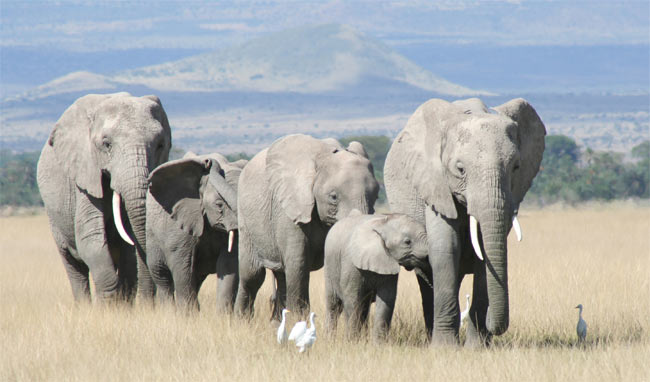Zoo Elephants Die Very Young

Elephants in European zoos live dramatically shorter lives than pachyderms in the wild, finds a new study.
The research is based on health information for 4,500 Asian and African elephants living in some 270 European zoos between 1960 and 2005 and their counterparts living in the wild either in Kenya or as working animals in Myanmar.
The wild creatures live decades longer, on average.
The new information will shed light on a longstanding debate about the physical and mental well-being of zoo elephants. One of the main tensions has been between animal welfare scientists and activists, who think keeping such an intelligent and social animal as an elephant captive is unethical, and zoo scientists, who look at elephants as sort of ambassadors for endangered populations in the wild, said George Amato, a wildlife conservation geneticist at the American Museum of Natural History in New York City. Amato was not involved in the current study.
Regardless of the life spans of elephants in captivity, Amato said, the real problem threatening both species with extinction is human-caused and takes place in the wild where the animals suffer from, among other threats, habitat destruction and being killed for their tusks to fuel the ivory trade.
The results, published in the Dec. 12 issue of the journal Science, likely apply to zoo elephants in the United States as well, said researcher Georgia Mason of the University of Guelph in Canada.
Elephant life spans
Get the world’s most fascinating discoveries delivered straight to your inbox.
Mason and her colleagues found that the median life span for African elephants was about 17 years for zoo-born females compared with 56 years for females living in Amboseli National Park, Kenya. That means that half of the zoo-born elephants are dead by the age of 17, whereas half of the wild population don't die until age 56.
The Asian elephants, which are the most endangered of the two species, fared worse than the African ones in zoos, the researchers found. About half of the Asian elephants in zoos were dead by age 19, compared with age 42 for their counterparts in the wild working for the Myanma Timber Enterprise.
Asian elephants born in the wild and brought into zoos at a median age of about 3.5 years lived to much older ages than the zoo-born Asian elephants, the researchers found. This led them to think that wild Asian elephants have some kind of protective factor and that their counterparts in zoos were dying partially due to something that occurred early in their lives in captivity.
"Because [the Asian elephants] are brought in as infants, that means something is happening really early in their lives or possibly even in the uterus that is kind of protecting the wild-born animals so that they live to a decent old age and is predisposing the zoo-born animals to dying early in adulthood," Mason told LiveScience.
She added, "You see the effects of being conceived and born in a zoo 15 or 20 years later. And these animals just start dying relatively early in adulthood. It's the most surprising thing we found."
Zoo stress
The results speak to the fact that elephants are so darn big and have sophisticated social lives.
"I'm not surprised at the findings," Amato said during a telephone interview, "because anyone who studies wildlife would imagine that … almost any species of vertebrate that is of such a size is going to pose challenges to meet its requirements in a captive environment." He added, "Then you layer on the fact that it has very complex social interactions that are almost impossible to replicate."
Most elephants live in large herds of related females with males interacting with these groups in various ways. Zoos tend to have just a few elephants in the same enclosure.
In fact, the researchers suspect social stress due to transfers of the elephants between zoos could be partly to blame for shorter life spans of zoo-kept versus wild elephants. "The animals form social bonds and then they are broken when it's moved by itself to another zoo," Mason said.
Obesity in zoo elephants could also take years off the animals' lives. "We suspect the zoo animals are overweight and that weight problems might be one of the causes of early death," Mason said.
Mason added that the zoo elephants should be screened for signs of stress and obesity before it's too late. Using premature death as a proxy for elephants' well-being in zoos is inefficient and inhumane, she said.
In addition, the research team suggests zoos should slow down or cease inter-zoo transfers until more research reveals better alternatives. For instance, perhaps transferring pairs of elephants would make for healthier elephants in zoos compared with single-elephant transfers.
- All About Zoos
- 10 Species Success Stories
- Images: The World's Biggest Beasts
Jeanna Bryner is managing editor of Scientific American. Previously she was editor in chief of Live Science and, prior to that, an editor at Scholastic's Science World magazine. Bryner has an English degree from Salisbury University, a master's degree in biogeochemistry and environmental sciences from the University of Maryland and a graduate science journalism degree from New York University. She has worked as a biologist in Florida, where she monitored wetlands and did field surveys for endangered species, including the gorgeous Florida Scrub Jay. She also received an ocean sciences journalism fellowship from the Woods Hole Oceanographic Institution. She is a firm believer that science is for everyone and that just about everything can be viewed through the lens of science.
 Live Science Plus
Live Science Plus





